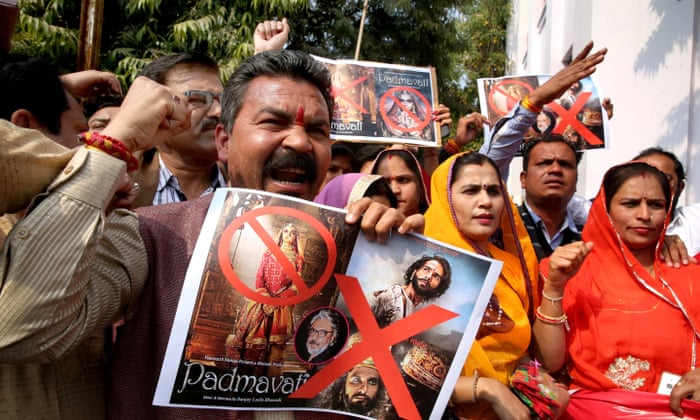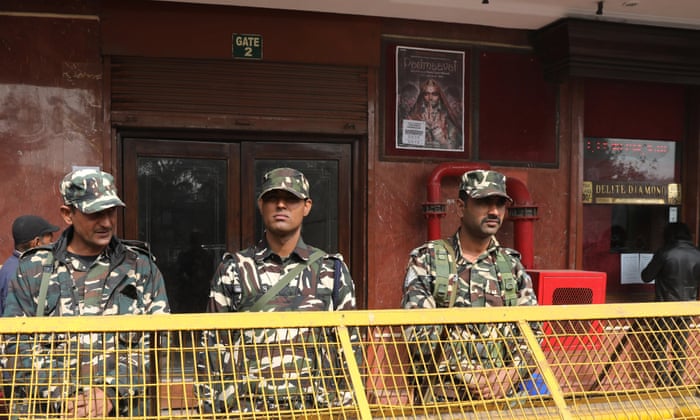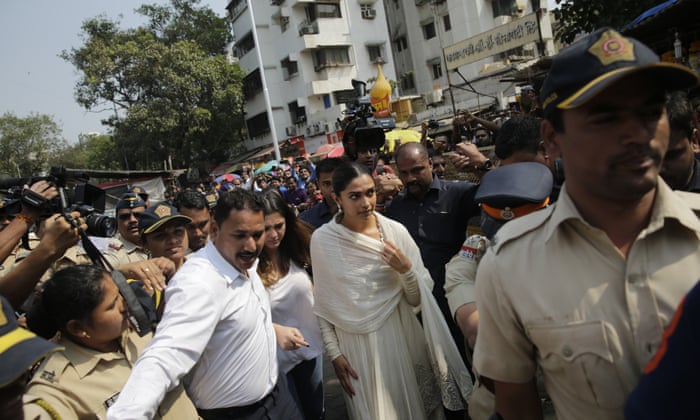Much Ado: Cinematic Verity and Violence
"We behave rather strangely for a country acclaimed as the world's largest democracy."
"In a country beset with such serious problems as a slowing economy, crumbling infrastructure, suffocating pollution, ailing health care and a pathetic education system, the national conversation is dominated by a mythical character."
Aroon Purie, editor-in-chief, India Today, India
"Karni Sena [the hardline Rajput group leading the protests] was unknown outside Rajasthan so far."
"In 2010 when they vandalized theatres in Rajasthan over a less high-profile film, they barely received attention."
"By now strategically going after a highly anticipated film like Padmaavat, they have gained national visibility."
Anna MM Vetticad, Indian film critic and author
 |
Members of the Indian Rajput
community hold placards during a protest against the release of the
Bollywood movie Padmaavat in Bhopal. Photograph: Sanjeev Gupta/EPA
|
Extremist Hindu groups have taken to whipping their faithful into a frenzy of outrage over a recently produced Bollywood film portraying a dramatized version of a legendary 14th Century Hindu queen who is popularly believed to have committed suicide rather than surrender to the amatory advances of a Muslim grandee consumed with carnal desire for her supposedly unmatched beauty. The Hindu queen, Padmavati, is considered a saint by many who believe the legend to be fact and who now are enraged that Bollywood has trivialized her memory.
Indian riot police have been mobilized in various areas of India to put down violent protests where movie theatres have been vandalized, vehicles burned, a school bus pelted with stones. The school bus, carrying children and their teachers drove into a near-riot. A video clip of terrified and weeping children crouching on the floor of the bus while windows were being smashed by rocks flung by a screeching horde outside, portrayed an image of a world gone mad. That same mob had earlier torched a state transport bus after the passengers had disembarked.
The Rajput community of Rajasthan, in reverence of the legendary Queen Padmavati whom historians doubt ever existed, has been the source of the opposition to the film and the savage temper of the crowds that has resulted from their incitement to react. In the film, the queen is shown as "flirting" with a sultan, though she is the wife of the king of the Rajputs. According to its critics, the film is not "historically accurate", which is a bit of a stretch since there is no historical evidence to support the contention that this deity-like personage ever even existed.
"Rajputs [the ethnic tribe depicted in the controversial film] can never even think of attacking a school bus. This is a plot being created by politicians, who wish to weaken our peaceful protest", Vijendra Singh, a spokesman for the group attested. While in its filming stages death threats were sent to the cast and director of the film. Some state governments refused to allow the film to be screened, though the Indian supreme court ruled this to be an illegal move.
 |
| Indian security personnel stand guard during the screening of Padmaavat at a cinema hall in New Delhi.
Photograph: Rajat Gupta/EPA
|
The fact that few people have yet seen the film, perplexes Indian intellectuals, given that fact and the widely reported violence that has accompanied its release; it is hearsay and that alone that motivates the mob violence. And though the leader of the Muslim invasion the film depicts, Alauddin Khilji, did exist as well as the Hindu king Ratnasimha, there are no historical sources to be found giving mention of Queen Padmavati. "We are living in strange times", commented Manish Tewari, an official of the nation's leading opposition party.
The film was believed to have cost around $30 million in its production. Whether that investment will be recouped is now in doubt since many cinema owners refuse to allow the film to be shown in their premises for fear of their own safety, much less that of their theatres. The reputation of the warrior tradition of the Rajput caste established in Gujarat and Rajasthan states places fear in the hearts of those who know they will become a target for violence should they be foolhardy enough to invite the film into their premises.
Albeit in sane minds this is much ado about nothing, in India this is a serious matter. Or one of delicious absurdity. Given the fact that a group of 300 women has threatened mass suicide should the film be shown anywhere. They await a response from the government before embarking on making good on their threat. A Bharatiya Janata Party official (state level) offered a bounty to anyone who would defend the honour of Queen Padmavati by beheading the lead actress and the director of the film.
 |
Bollywood actor Deepika
Padukone, centre, arrives escorted by police to offer prayers at a Hindu
temple ahead of the release of Padmaavat in Mumbai on Tuesday. Photograph: Rafiq Maqbool/AP
|
Labels: Bollywood, Controversy, Fundamentalism, Hindus, India, Violence

<< Home